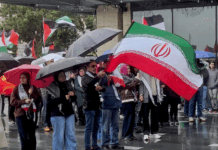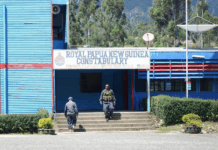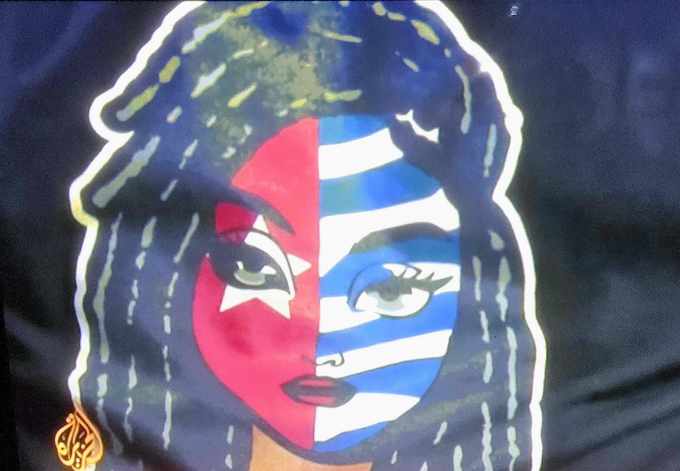
ANALYSIS: By David Robie, editor of Asia Pacific Report
On my office wall hangs a framed portrait of Shireen Abu Akleh, the inspiring and celebrated American-Palestinian journalist known across the Middle East to watchers of Al Jazeera Arabic, who was assassinated by an Israeli military sniper with impunity.
State murder.
She was gunned down in full blue “press” kit almost two years ago while reporting on a raid in the occupied West Bank’s Jenin refugee camp, clearly targeted for her influence as a media witness to Israeli atrocities.
As in the case of all 22 journalists who had been killed by Israeli military until that day, 11 May 2022, nobody was charged.
Now, six months into the catastrophic and genocidal Israeli War on Gaza, some 137 Palestinian journalists have been killed — murdered – by Israeli snipers, or targeted bombs demolishing their homes, and even their families.
Also in my office is pasted a red poster with a bird-of-paradise shaped pen in chains and the legend “Open access for journalists – Free press in West Papua.”
The poster was from a 2017 World Media Freedom Day conference in the Indonesian capital of Jakarta, which I attended as a speaker and wrote about. Until this day, there is still no open door for international journalists
Harassed, beaten
Although only one killing of a Papuan journalist is recorded, there have been many instances when local news reporters have been harassed, beaten and threatened – beyond the reach of international media.
Ardiansyah Matra was savagely beaten and his body dumped in the Maro River, Merauke. A spokesperson for the Alliance of Independent Journalists (AJI), Victor Mambor, said at the time: “‘It’s highly likely that his murder is connected with the terror situation for journalists which was occurring at the time of Ardiansyah’s death.”
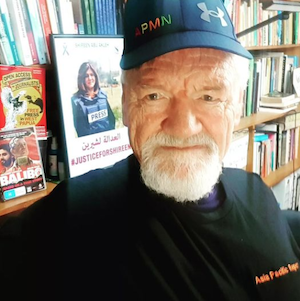
Frequently harassed himself, Mambor, founder and publisher of Jubi Media, was apparently the target of a suspected bomb attack, or warning, on 23 January 2023, when Jayapura police investigated a blast outside his home in Angkasapura Village.
At first glance, it may seem strange that comparisons are being made between the War on Gaza in the Middle East and the long-smouldering West Papuan human rights crisis in the Asia-Pacific region almost 11,000 km away. But there are several factors at play.
Melanesian and Pacific activists frequently mention both the Palestinian and West Papuan struggles in the same breath. A figure of up to 500,000 deaths among Papuans is often cited as the toll from 1969 when Indonesia annexed the formerly Dutch colony in controversial circumstances under the flawed Act of Free Choice, characterised by critics as the Act of “No” Choice.
The death toll in Gaza after the six-month war on the besieged enclave by Israel is already almost 33,000 (in reality far higher if the unknown number of casualties buried under the rubble is added). Most of the deaths are women and children.
At least 27 children have died of malnutrition so far with numbers expected to rise sharply.
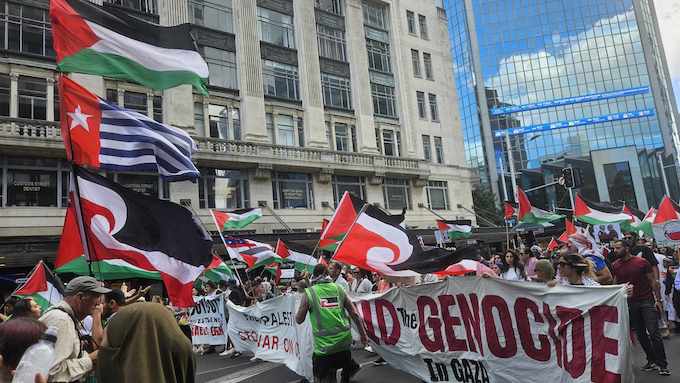
Ethnic cleansing
But there are mounting fears that Israel’s ethnic cleansing of the Gazans has no end in sight and the lives of 2.3 million people are at stake.
Both Palestinians and West Papuans see themselves as the victims of violent settler colonial projects that have been stealing their land and destroying their culture under the world’s noses — in the case of Palestine since the Nakba of 1948, and in West Papua since Indonesian paratroopers landed in a botched invasion in 1963.
They see themselves as both confronting genocidal leaders; Israeli Prime Minister Benjamin Netanyahu, whose popularity at home sinks by the day with growing protests, and Indonesia’s new President-elect Prabowo Subianto who has an atrocious human rights reputation in both Timor-Leste and West Papua.
And both peoples feel betrayed by a world that has stood by as genocides have been taking place — in the case of Palestine in real time on social media and television screens, and in the case of West Papua slowly over six decades.
Last November, outgoing Indonesian President Joko Widodo confronted US President Joe Biden on his policies over Gaza, and appealed for Washington to do more to prevent atrocities in Palestine.
Indonesian politicians such as Foreign Minister Retno Marsudi have been quick to condemn Israel, including at the International Court of Justice, but Papuan independence leaders find this hypocritical.
“We have full sympathy for the struggle for justice in Palestine and call for the restoration of peace,” said United Liberation Movement for West Papua (ULMWP) president Benny Wenda.
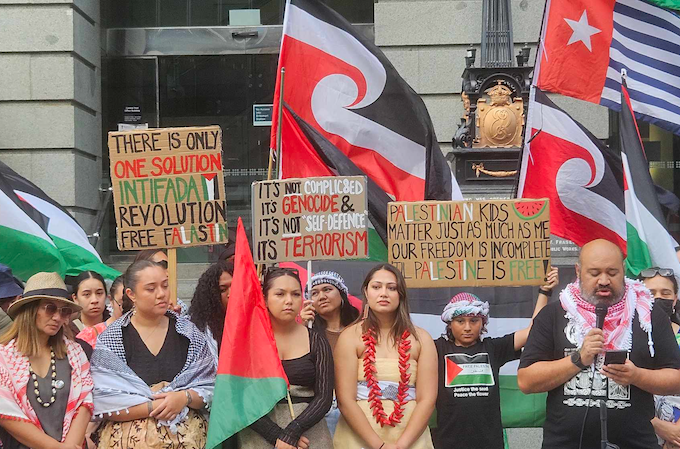
‘Where’s Indonesian outrage?’
“But what about West Papua? Where was Indonesia’s outrage after Bloody Paniai [2014], or the Wamena massacre in February?
“Indonesia is claiming to oppose genocide in Gaza while committing their own genocide in West Papua.”
“Over 60 years of genocidal colonial rule, over 500,000 West Papuans have been killed by Indonesian forces.”
Wenda said genocide in West Papua was implemented slowly and steadily through a series of massacres, assassinations and policies, such as the killings of the chair of the Papuan Council Theys Eluay in 2001; Mako Tabuni (2012); and cultural curator and artist Arnold Ap (1984).
He cited many independent international and legal expert reports for his “considered position”, such as Yale University Law School, University of Wollongong, and the Asian Human Rights Commission – The Neglected Genocide.
In the South Pacific, Indonesia is widely seen among civil society, university and community groups as a ruthless aggressor with little or no respect for the Papuan culture.
Jakarta is engaged in an intensive diplomacy campaign in an attempt to counter this perception.
Unarmed Palestinians killed in Gaza – revealing Israel’s “kill zones”. Video: Al Jazeera
Israel’s ‘rogue’ status
But if Indonesia is unpopular in the Pacific over its brutal colonial policies, it is nothing compared to the global “rogue” status of Israel.
In the past few weeks, as atrocity after atrocity pile up and the country’s disregard for international law and United Nations resolutions increasingly shock, supporters appear to be shrinking to its long-term ally the United States and its Five Eyes partners with New Zealand’s coalition government failing to condemn Israel’s war crimes.
On Good Friday — Day 174 of the war – Israel bombed Gaza, Syria and Lebanon on the same day, killing civilians in all three countries.
In the past week, the Israeli military ratcheted up its attacks on the Gaza Strip in defiance of the UN Security Council’s order for an immediate ceasefire, expanded its savage attacks on neighbouring states, and finally withdrew from Al-Shifa Hospital after a bloody two-week siege, leaving it totally destroyed with at least 350 patients, staff and displaced people dead.
Fourteen votes against the lone US abstention after Washington had earlier vetoed three previous resolutions produced the decisive ceasefire vote, but the Israeli objective is clearly to raze Gaza and make it uninhabitable.
As The Guardian described the vote, “When Gilad Erdan, the Israeli envoy to the UN, sat before the Security Council to rail against the ceasefire resolution it had just passed, he cut a lonelier figure than ever in the cavernous chamber.”
The newspaper added that the message was clear.
‘Time was up’
“Time was up on the Israeli offensive, and the Biden administration was no longer prepared to let the US’s credibility on the world stage bleed away by defending an Israeli government which paid little, if any, heed to its appeals to stop the bombing of civilian areas and open the gates to substantial food deliveries.”
Al Jazeera interviewed Norwegian physician Dr Mads Gilbert, who has spent long periods working in Gaza, including at al-Shifa Hospital. He was visibly distressed in his reaction, lamenting that the Israeli attack had “destroyed” the 78-year legacy of the Strip’s largest and flagship hospital.
Speaking from Tromso, Norway, he said: “This is such a sad day, I’ve been weeping all morning.”
Dr Gilbert said he did not know the fate of the 107 critical patients who had been moved two days earlier to an older building in the complex.
“The maggots that are creeping out of the corpses in al-Shifa Hospital now,” he said, “are really maggots coming out of the eyes of President Biden and the European Union leaders doing nothing to stop this horrible, horrible genocide.”
Australia-based Antony Loewenstein, the author of The Palestine Laboratory, who has been reporting on Israel and the occupied Palestinian territories for two decades, described Israel’s attack on the hospital as the “actions of a rogue state”.
Gaza health officials said Israel was targeting all the hospitals and systematically destroying the medical infrastructure. Only five out of a total of 37 hospitals still had some limited services operating.
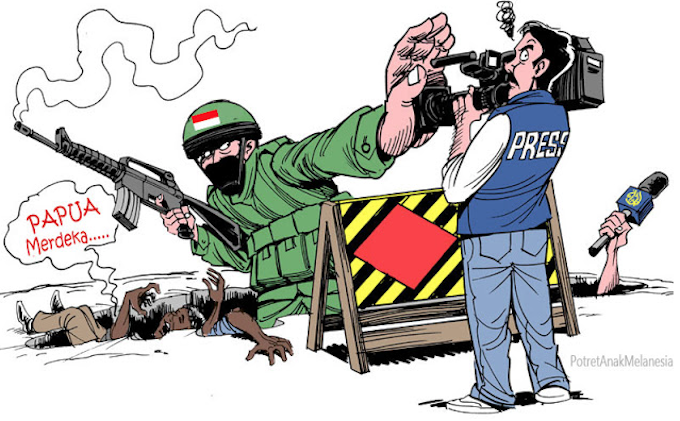
Strike on journalists’ tent
Yesterday, four people were killed and journalists were wounded in an Israeli air strike on a tent in the courtyard of al-Aqsa Hospital in Deir el-Balah in central Gaza.
The Israeli military claimed the strike was aimed at a “command centre” operated by the Palestinian Islamic Jihad armed group, but footage screened by Al Jazeera reporter Hind Khoudary clearly showed it was a tent where displaced people were sheltering and journalists and photographers were working.
The Israeli military have killed another photojournalist and editor, Abdel Wahab Awni, when they bombed his home in the Maghazi refugee camp. This took the number of journalists killed since the start of the war to 137, according to Gaza’s Government Media Office.
Al Jazeera has revealed that Israel was using “kill zones” for certain combat areas in Gaza. Anybody crossing the “invisible” lines into these zones was shot on sight as a “terrorist”, even if they were unarmed civilians.
The chilling practice was exposed when footage was screened of two unarmed civilians carrying white flags being apparently gunned down and then buried by bulldozer under rubble. A US-based civil rights group described the killings as a “heinous crime”.
The kill zones were confirmed at the weekend by the Israeli newspaper Haaretz, which said the military had claimed to have killed 9000 “terrorists”, but officials admitted that many of the dead were often civilians who had “crossed the line” of fire.
Call for sanctions
The Israeli peace advocacy group Gush Shalom sent an open letter to all the embassies credited to Israel calling for immediate sanctions against the Israeli government, saying Netanyahu was “flagrantly refusing” to comply with the ceasefire resolution.
“We, citizens of Israel,” said the letter, “are calling on your government to initiate a further meeting of the Security Council, aiming to pass a resolution which would set effective sanctions on Israel — in order to bring about an immediate ceasefire in the Gaza Strip until the end of Ramadan and beyond it.”
A Palestinian-American professor of law Dr Noura Erakat, of Rutgers University, recently told a BBC interviewer that Israel had made its end game very clear from the beginning of the war.
“Israel has made its intent clear. Its war cabinet had made its intent clear. From the very beginning, in the first week of October 7, it told us its goal was to depopulate Gaza.
“They have equated the decimation of Hamas, which they cannot achieve militarily, with the depopulation of the entire Gaza strip.”
A parallel with Indonesia’s fundamentally flawed policies in West Papua. Failing violent settler colonialism.





























